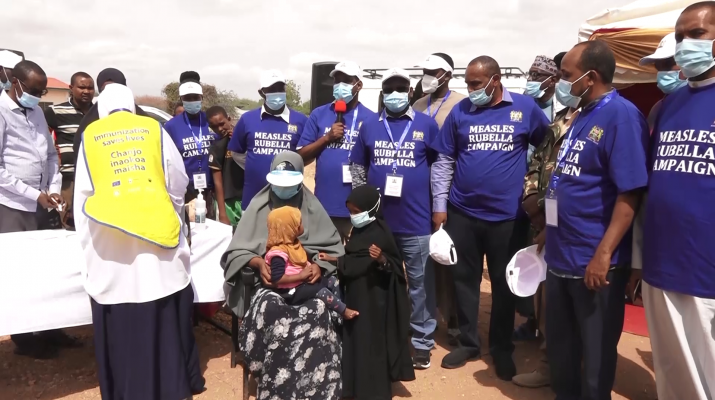The county is targeting to vaccinate 165,000 children from the seven sub counties and the refugee camps within the next 10-days.
Speaking at Bulla Medina Health Center, Garissa County Secretary Abdi Sheikh said the exercise will accelerate the county’s progress towards achievement of measles and Rubella elimination.
Sheikh appealed to all stakeholders including national government administrators, teachers, religious leaders, and local leaders to support the health department in order to achieve the vaccination target.
“Concerted efforts from all stakeholders will assist to mobilize communities to bring out their children for vaccination,” Sheikh said
He expressed the need to raise awareness on the importance of immunization services, prioritizing in linking children to the nearest health facility and improving community health seeking behavior.
Health CEC Roble Nunow expressed confidence that the team will reach at least 95 per cent of the targeted children in all the sub counties and refugee camps.
Roble said that the County Government deployed mobile teams to cover far-flung areas, which were rarely covered by routine immunization services.
He urged all involved to observe Covid-19 protocols during the exercise.
Ministry of health representative Dr. Tabitha Oketch reiterated that the vaccine is safe for the children and rallied the residents to ensure that the children in the bracket age receive the vaccine.
“Measles is a very contagious disease and we need to ensure that all our children who are eligible for vaccination are given the vaccine for us to control the outbreaks that has been occurring in this county and other parts of the country,” Oketch said
A risk assessment conducted by the country with the support of the World Health Organization (WHO) identified 22 counties as being at very high risk for measles outbreaks.
The counties are Mandera, Wajir, Garissa, Baringo, West Pokot, Turkana, Kilifi, Tana River, Trans Nzoia, Elgeyo Marakwet, Busia, Homa Bay, Migori, Kisii, Kajiado, Nairobi, Bomet, Bungoma, Kakamega, Narok and Vihiga.
Between 2013 and 2015, 1,468,268 children aged below one year were not effectively reached with the measles vaccine. Further, only 85 per cent of children vaccinated against measles develop immunity from the first dose, hence the need for the introduction of Measles Second Dose at 18 months.
Kenya has been offering measles one at nine months and from July 2013 an additional second dose at 18 months.
Rubella like Measles is a highly infectious viral disease that can cause serious health complications to newborns such as birth defects, including heart problems, loss of hearing and eyesight, and brain damage.

